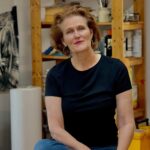
One of the highlights of this past year for me was seeing the Nick Cave exhibition at the Guggenheim, especially his Sound Suits.
Transcript
Tricia: [00:00:17] Hey, everybody, it’s Tricia Rose Burt and welcome to our fourth mini episode. It’s the end of the year and so, like a lot of us, I’m doing an annual review, going through my calendar and looking at what I did last year. And one of the best things I did was see some great art, which is key for all of us creative types. A Nick Cave show at the Guggenheim blew my mind, especially his Sound Suits. If you’ve never seen them, you’ve got to look them up online. I’ll have a link in the show notes so you can check them out. They’re made out of anything you can think of. I mean, anything — this crazy ass variety of materials, including beads, buttons, shoelaces, toys, antiques, all different shapes, all different fabrics. They’re incredible creations. And even more incredible is the reason why Cave makes them. I’m going to read to you the explanation from the exhibition, so I get it right. Nick Cave conceived his first sound suits following the Los Angeles Police Department’s brutal beating of Rodney King in 1991, which a witness captured on video. Soon after seeing the footage on the news, Cave sat in a Chicago park contemplating King’s treatment and the broader injustice of police violence against Black men. As he sat, he began collecting twigs from the ground. He later sewed these twigs into a suit of armor, which he envisioned as a means of obscuring his identity as a queer Black man for protection while paradoxically amplifying his radical otherness. The term Sound Suit originates from the experience of wearing the garment. The artist explains, “Once I put it on and moved in it, I realized that was the protest, the sound it made. In order to be heard, you gotta make sound.” I love that. Cave has created hundreds of Sound Suits over time, and as the text goes on to say, each conjures feelings of celebration and a reminder that joy, too, can be a form of resistance. I love that even more. Joy as resistance. What could be better, particularly now, while the world is on fire? Nick Cave asks an important question in relation to his work and how we navigate our lives. He says, “I want it to be beautiful, even when the subject is hard. Honey, the question is how do you want to exist in this world and how are you going to do the work?” With Nick Cave’s art inspiring me, I plan to make sound, be joyful and put as much beauty in the world as I can in 2024. Join me, because this is no time to be timid. Happy New Year, everybody. If you want to jump start your creative courage, go back and listen to Seasons One and Two of the podcast. Learn more about No Time to be timid at my webite, triciaroseburt.com. And make sure to follow me on social media @triciaroseburt. No Time to Be Timid is sponsored by Interabang Books, a Dallas-based independent bookstore, which was named one of the top five bookstores in the country. They have a fabulous, curated online collection. Check them out at interabangbooks.com. That’s interabangbooks.com. [00:04:03][226.0]
Tricia: [00:04:21] No Time to Be timid is written and produced by me, Tricia Rose Burt. Our episodes are produced and scored by Adam Arnone of Echo Finch, and our theme music is Twists and Turns by the Paul Dunlea Group. If you like what you hear, please subscribe to the show, spread the word, and review us on Apple Podcasts, Spotify, or wherever you listen. No Time to be Timid is a presentation of I Will Be Good Productions. [00:04:21][0.0]